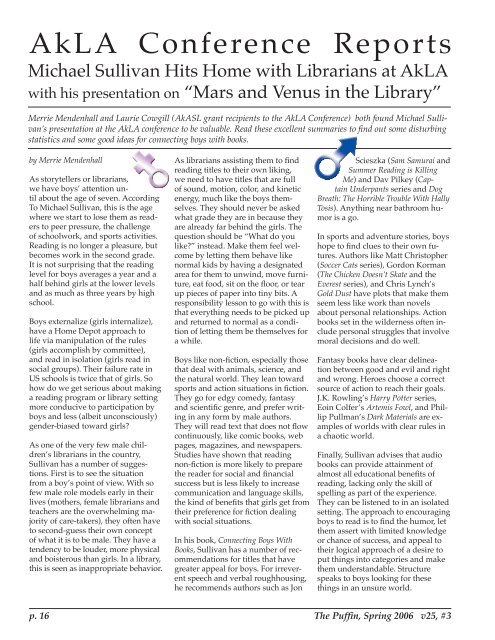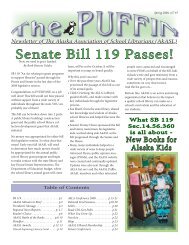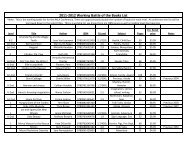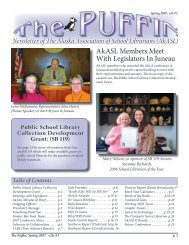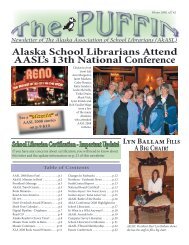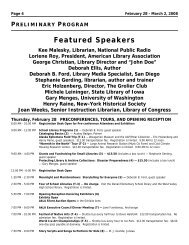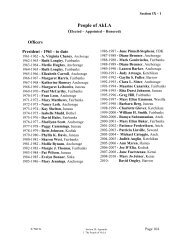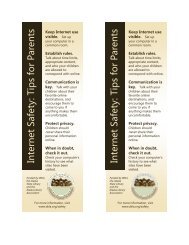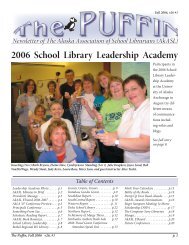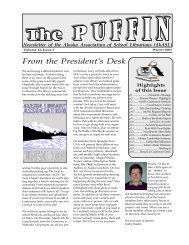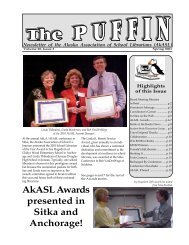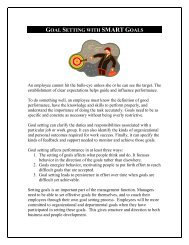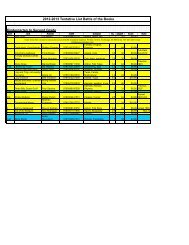Lois Petersen Becomes Life - Alaska Library Association
Lois Petersen Becomes Life - Alaska Library Association
Lois Petersen Becomes Life - Alaska Library Association
You also want an ePaper? Increase the reach of your titles
YUMPU automatically turns print PDFs into web optimized ePapers that Google loves.
AkLA Conference Reports<br />
Michael Sullivan Hits Home with Librarians at AkLA<br />
with his presentation on “Mars and Venus in the <strong>Library</strong>”<br />
Merrie Mendenhall and Laurie Cowgill (AkASL grant recipients to the AkLA Conference) both found Michael Sullivan’s<br />
presentation at the AkLA conference to be valuable. Read these excellent summaries to find out some disturbing<br />
statistics and some good ideas for connecting boys with books.<br />
by Merrie Mendenhall<br />
As storytellers or librarians,<br />
we have boys’ attention until<br />
about the age of seven. According<br />
To Michael Sullivan, this is the age<br />
where we start to lose them as readers<br />
to peer pressure, the challenge<br />
of schoolwork, and sports activities.<br />
Reading is no longer a pleasure, but<br />
becomes work in the second grade.<br />
It is not surprising that the reading<br />
level for boys averages a year and a<br />
half behind girls at the lower levels<br />
and as much as three years by high<br />
school.<br />
Boys externalize (girls internalize),<br />
have a Home Depot approach to<br />
life via manipulation of the rules<br />
(girls accomplish by committee),<br />
and read in isolation (girls read in<br />
social groups). Their failure rate in<br />
US schools is twice that of girls. So<br />
how do we get serious about making<br />
a reading program or library setting<br />
more conducive to participation by<br />
boys and less (albeit unconsciously)<br />
gender-biased toward girls?<br />
As one of the very few male children’s<br />
librarians in the country,<br />
Sullivan has a number of suggestions.<br />
First is to see the situation<br />
from a boy’s point of view. With so<br />
few male role models early in their<br />
lives (mothers, female librarians and<br />
teachers are the overwhelming majority<br />
of care-takers), they often have<br />
to second-guess their own concept<br />
of what it is to be male. They have a<br />
tendency to be louder, more physical<br />
and boisterous than girls. In a library,<br />
this is seen as inappropriate behavior.<br />
p. 16<br />
As librarians assisting them to find<br />
reading titles to their own liking,<br />
we need to have titles that are full<br />
of sound, motion, color, and kinetic<br />
energy, much like the boys themselves.<br />
They should never be asked<br />
what grade they are in because they<br />
are already far behind the girls. The<br />
question should be “What do you<br />
like?” instead. Make them feel welcome<br />
by letting them behave like<br />
normal kids by having a designated<br />
area for them to unwind, move furniture,<br />
eat food, sit on the floor, or tear<br />
up pieces of paper into tiny bits. A<br />
responsibility lesson to go with this is<br />
that everything needs to be picked up<br />
and returned to normal as a condition<br />
of letting them be themselves for<br />
a while.<br />
Boys like non-fiction, especially those<br />
that deal with animals, science, and<br />
the natural world. They lean toward<br />
sports and action situations in fiction.<br />
They go for edgy comedy, fantasy<br />
and scientific genre, and prefer writing<br />
in any form by male authors.<br />
They will read text that does not flow<br />
continuously, like comic books, web<br />
pages, magazines, and newspapers.<br />
Studies have shown that reading<br />
non-fiction is more likely to prepare<br />
the reader for social and financial<br />
success but is less likely to increase<br />
communication and language skills,<br />
the kind of benefits that girls get from<br />
their preference for fiction dealing<br />
with social situations.<br />
In his book, Connecting Boys With<br />
Books, Sullivan has a number of recommendations<br />
for titles that have<br />
greater appeal for boys. For irreverent<br />
speech and verbal roughhousing,<br />
he recommends authors such as Jon<br />
Scieszka (Sam Samurai and<br />
Summer Reading is Killing<br />
Me) and Dav Pilkey (Captain<br />
Underpants series and Dog<br />
Breath: The Horrible Trouble With Hally<br />
Tosis). Anything near bathroom humor<br />
is a go.<br />
In sports and adventure stories, boys<br />
hope to find clues to their own futures.<br />
Authors like Matt Christopher<br />
(Soccer Cats series), Gordon Korman<br />
(The Chicken Doesn’t Skate and the<br />
Everest series), and Chris Lynch’s<br />
Gold Dust have plots that make them<br />
seem less like work than novels<br />
about personal relationships. Action<br />
books set in the wilderness often include<br />
personal struggles that involve<br />
moral decisions and do well.<br />
Fantasy books have clear delineation<br />
between good and evil and right<br />
and wrong. Heroes choose a correct<br />
source of action to reach their goals.<br />
J.K. Rowling’s Harry Potter series,<br />
Eoin Colfer’s Artemis Fowl, and Phillip<br />
Pullman’s Dark Materials are examples<br />
of worlds with clear rules in<br />
a chaotic world.<br />
Finally, Sullivan advises that audio<br />
books can provide attainment of<br />
almost all educational benefits of<br />
reading, lacking only the skill of<br />
spelling as part of the experience.<br />
They can be listened to in an isolated<br />
setting. The approach to encouraging<br />
boys to read is to find the humor, let<br />
them assert with limited knowledge<br />
or chance of success, and appeal to<br />
their logical approach of a desire to<br />
put things into categories and make<br />
them understandable. Structure<br />
speaks to boys looking for these<br />
things in an unsure world.<br />
The Puffin, Spring 2006 v25, #3


